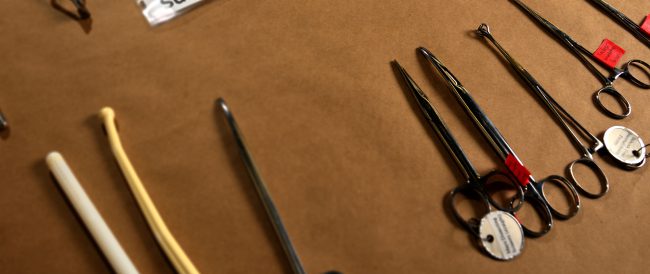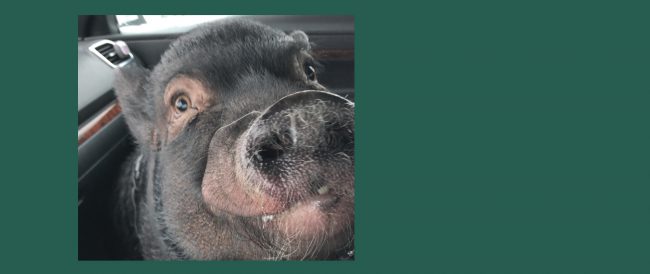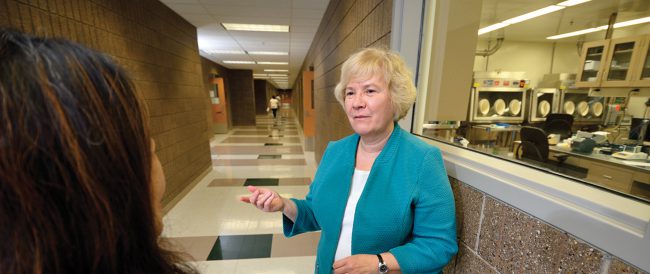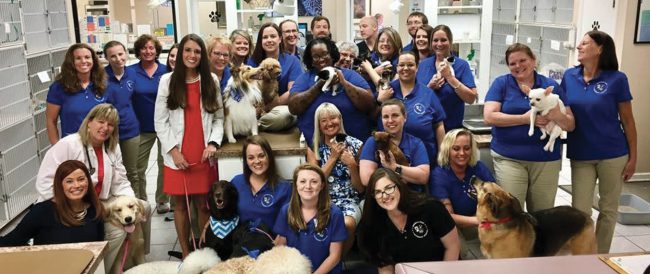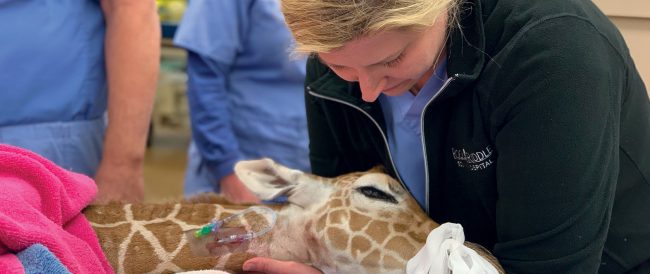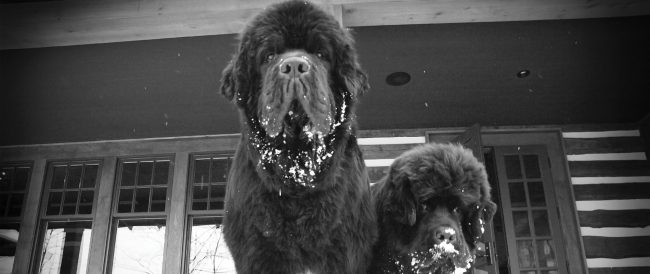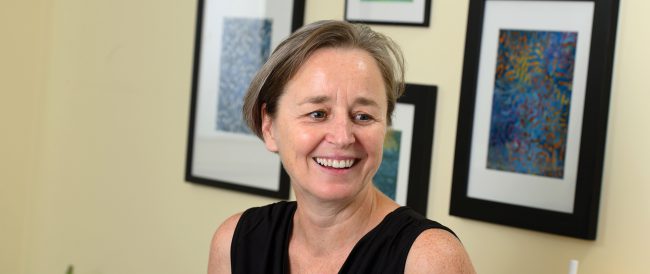 Read More
Read More
Dr. Ángel Abuelo, assistant professor in Cattle Health and Wellbeing for the Department of Large Animal Clinical Sciences at the Michigan State University College of Veterinary Medicine, is working to solve the national shortage of food animal veterinarians.
In North America, food animal veterinarians are becoming more scarce in all sectors: public, private, industrial, and academic.
“It’s a multifaceted issue,” says Abuelo. “This trend not only impacts veterinarians and veterinary medical education, but the agriculture and dairy industries, farmers, food animals, and consumers.”
Partners in This Mission
- Dr. Sabine Mann, assistant professor for the Department of Population Medicine and Diagnostic Sciences at the Cornell University College of Veterinary Medicine, co-principal investigator on this project, and lead of this initiative at Cornell
- Dr. Nigel Cook, professor for the Department of Medical Sciences at the University of Wisconsin-Madison School of Veterinary Medicine and lead of this initiative at University of Wisconsin-Madison
- Dr. Ron Erskine, professor for the Department of Large Animal Clinical Sciences at the Michigan State University College of Veterinary Medicine
- Dr. Roger Thomson, academic specialist for the Department of Animal Science at Michigan State University
- Dr. Jessica A. McArt, assistant professor for the Department of Population Medicine and Diagnostic Services at the Cornell University College of Veterinary Medicine
- Dr. Blake Nguyen, lecturer in Animal Sciences for the Department of Population Medicine and Diagnostic Services at the Cornell University College of Veterinary Medicine
- Dr. Matthias Wieland, extension associate for the Department of Population Medicine and Diagnostic Services at the Cornell University College of Veterinary Medicine
- Dr. Tom Overton, professor for the Department of Animal Science at the Cornell University College of Veterinary Medicine, director of PRO-DAIRY, and associate director of Cornell Cooperative Extension
- Dr. Julio Giordano, associate professor for the Department of Animal Science at the Cornell University College of Veterinary Medicine
- US Food and Drug Administration's Center for Veterinary Medicine
- Michigan Department of Agriculture and Rural Development
- Various private veterinary companies
Based on data from the United States Department of Agriculture (USDA) Veterinary Services Shortage Situations, bovine practice continues to be the area within food animal veterinary medicine with the greatest lack of service to veterinary-underserved regions. “Producers are unable to provide some types of care for these animals, so their quality of care, and life, suffers. This, in turn, impacts their health and wellbeing, and the wellbeing of the industry as a whole,” says Abuelo.
Driven by his passion and practice, Abuelo proposed a grant to the USDA’s National Institute of Food and Agriculture (NIFA), “Improving food-animal veterinary service shortage situations in rural bovine practice through recruitment and continuing education of early-career veterinarians.” In December of 2018, Abuelo and his colleagues from Cornell and Wisconsin veterinary colleges partnered on this joint USDA project. The project aims to alleviate the shortage of rural veterinarians in the United States by increasing the awareness of rural practice among DVM students and providing continuing education to early-career veterinarians, who work in veterinary-underserved areas.
“This collaborative grant allows us to link veterinarians who are passionate about careers in rural livestock medicine to those who will benefit most from their expertise,” says Dr. Birgit Puschner, dean for the MSU College of Veterinary Medicine. “This grant identifies and makes accessible career and lifestyle opportunities for those beginning work in veterinary medicine.”
According to NIFA, this grant—which is part of the Veterinary Services Grant Program—is intended to “relieve veterinarian shortage situations and support veterinary services.” During this project, annual events intended to promote rural practice and lifestyle among veterinary students will be organized at MSU and Cornell University. These include roundtable discussions with early-career veterinarians (within five years of graduation) and support for senior DVM student externships. In addition, a bovine medical distance continuing education program, complemented with hands-on workshops at MSU and Cornell, will be organized for 40 early-career veterinarians and offered at no cost.
“Veterinary medicine is fundamentally linked to human health, but unfortunately, this crucial role is often undervalued,” says Puschner. “Veterinarians have a responsibility to protect human health by ensuring food safety and providing food animal production and care services. MSU has an obligation to train practice-ready veterinarians, and this grant allows us to make a difference in underserved areas.”
The challenge begins with the shift in the backgrounds of veterinary medical students. “These days, many more students come from cities than they do from rural or agricultural areas. So, their experience with agriculture is limited prior to coming to veterinary medical school,” says Abuelo. “With the more hands-on curriculum, students at MSU are being exposed to food animal medicine much earlier on than they have been in the past.”
A multifaceted problem
“If I can show veterinary medical students how passionate I am about my work, address the many misconceptions there are about food animal medicine, and get them to explore the field, then I can guide and show them what the reality of the industry is and what their very important role in it could be.”
Finances are another problem. Per the United States Department of Labor’s Bureau of Labor Statistics, veterinarians who work in big cities make more money than those who work in rural areas. With an average debt of $143,747 after graduation, it is likely that DVM graduates who opt for work in a city will have more success finding a job, make more money, and pay off their debts sooner than their counterparts in food animal medicine.
If DVM students decide to go into food animal medicine, there’s no guarantee that’s where they will remain. “It’s not just about getting new food animal veterinarians, it’s about retaining the ones who are already in practice,” says Abuelo. “We need to support and educate them and give them what they need to succeed in their growth as food animal veterinarians. The culture of veterinary medicine has a significant role to play in this effort.”
Spartan Story: If You Can Dream it, You Can Do it

At a young age, Dr. Ángel Abuelo knew he wanted to work with dairy cows. Born and raised in Northeast Spain, Abuelo had always been surrounded by farmland and cows. “My family owned a dairy farm—my grandparents on both my mother’s and father’s sides and my uncles. I grew up there and was always with cows. I even spent the weekends and holidays there,” says Abuelo.
A long way from Spain, Abuelo is now a dairy specialist veterinarian by training. “I always say, if you have passion for something, you can do anything. And in turn, you can transmit that passion, which is contagious,” says Abuelo.
In December of 2017, the College welcomed him to its faculty as an assistant professor in Cattle Health and Wellbeing. “When the opportunity came to join the College’s faculty and work with dairy producers, students, and veterinarians in research, instruction, and extension, I didn’t have any doubt about relocating from Down Under, which is where I worked prior to MSU,” says Abuelo. “Michigan and MSU are great places to be. Here, I can contribute to the improvement of animal agriculture even further. I doubt I would have a better environment to do my work elsewhere.”
Abuelo’s research at the College focuses on boosting the immune systems of newborn calves so they can grow into healthy adult animals. He also partners on a joint USDA project to alleviate the shortage of rural veterinarians. “My role gives me the opportunity to search for and find new answers to problems that the dairy industry is facing,” says Abuelo. “It also allows me to move from doing research only in the lab to finding and implementing solutions in the field and in practice to see if they actually work.”
For Abuelo, protecting the dairy industry is personal. “If I can show veterinary medical students how passionate I am about my work, address the many misconceptions there are about food animal medicine, and get them to explore the field, then I can guide and show them what the reality of the industry is and what their very important role in it could be,” says Abuelo.
Exposure, exploration, passion, and retention—this is Abuelo’s role and commitment to the dairy industry. “I love what I do,” says Abuelo, “and I just want to share it with others. Facing challenges, showing future and current veterinarians my love for the industry, and finding solutions, whether they be in my lab, in the field, or in the classroom, motivates me to work harder. We all could have an impact on the industry, on bovine health, on farm profitability, and on the overall health and wellbeing of dairy cows.”


